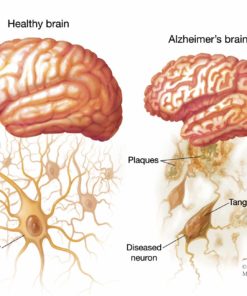The Cognoscopy Panel
The Cognoscopy Panel, was developed by Dr. Dale Bredesen, M.D. to provide a unique lens through which we can view the complexity of your health, specifically in relation to Alzheimer’s and dementia. These lab test panels form a critical part of the holistic assessment and nutritional treatment process:
- Tests copper, zinc, ceruloplasmin, homocysteine, vitamin D, and whole blood histamine. This panel is crucial for the assessment of mineral imbalances and inflammation, which are often associated with Alzheimer’s and other neurological disorders. For instance, elevated copper or homocysteine can contribute to neurodegeneration.
- Tests thyroid, sex hormones, and adrenal hormones. Hormonal imbalances can impact brain health and cognitive function. For example, an underactive thyroid can exacerbate cognitive decline and is often associated with a higher risk of Alzheimer’s.
- Tests cholesterol, glutathione, HGA1C, insulin, and CRP. These tests measure markers of metabolic health and inflammation. High insulin or cholesterol levels can lead to an increased risk of Alzheimer’s. In addition, glutathione, a powerful antioxidant, protects the brain against oxidative stress, a key factor in the development of Alzheimer’s.
- Tests mannitol, lactulose, transglutaminase tTG IgA, and tTG IgG. This panel evaluates gut health and immune response, which are crucial in Alzheimer’s given the growing evidence of the gut-brain axis’s role in neurological health
- Tests magnesium, selenium, methylmalonic acid, vitamins B1, B12, B6, C, and E. These nutrients are essential for brain function, and deficiencies can contribute to cognitive decline. For example, vitamins B6, B12, and B1 are essential for neuronal function and deficiencies can cause neurological and psychological disturbances.
- Tests APOE genetic markers. The presence of the APOE4 allele increases the risk of developing Alzheimer’s. Knowing your APOE status can be beneficial in tailoring preventive strategies and treatments.
These lab panels play an essential role in the Bredesen Protocol, a comprehensive, personalized approach to preventing and reversing cognitive decline and Alzheimer’s disease. This protocol uses these test results to design a tailored plan that targets the root causes of cognitive decline, including nutrient deficiencies, hormonal imbalances, inflammation, and genetic factors. A well-rounded nutritional approach, aimed at addressing these root causes, can help enhance cognitive health and prevent or even reverse Alzheimer’s disease.
Watch video interviews with Bredesen on Second Opinion Physician website.
All Cognoscopy Labs
All Cognoscopy Labs
Cognoscopy Panel #3 – Testing Glucose, Lipids and Inflammation
All Cognoscopy Labs
All Cognoscopy Labs
All Cognoscopy Labs
All Cognoscopy Labs
Cognoscopy #4 – Leaky Gut / Celiac Lab Tests (Zonulin, IgA/G, tTG)

